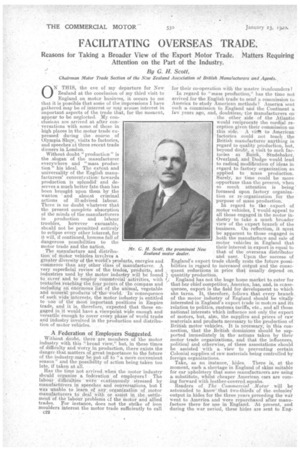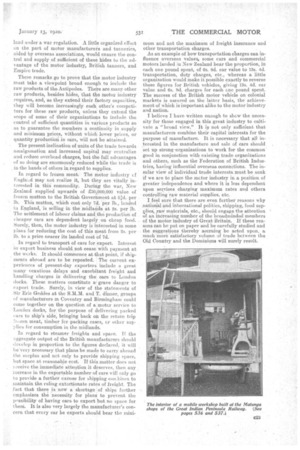FACILITATING OVERSEAS. TRADE,
Page 8

Page 9

If you've noticed an error in this article please click here to report it so we can fix it.
Reasons for Taking a Broader View of the Export Motor Trade. Matters Requiring Attention on the Part of the Industry.
By G. H. Scott,
Chairman Motor Trade Section of the N.No Zealand Association of British Manufacturers and Agents.
0 N THIS, the eve of my departure for New Zealand at the conclusion of my third visit to England on motor business, it occurs to me that it is possible that some of the impressions I have gathered may be of interest or may arouse interest in important aspects of the trade that, for the moment, appear to be neglected. My conclusions are arrived at after conversations with some of those in high places in the motor trade expressed during the coarse of Olympia Shoev, visits to factories, and speeches at three recent trade dinners in London.
Without doubt " production " is the .slogan of the manufacturer everywhere and "mass production" his ideal. The extent and universality of the English manufacturees'. concentration: towards production is splendid' and deserves a much better fate than has been brought upon them by the wan ton and almost criminal actions of ill-advised labour. There is no doubt whatever that the present complete absorption of the minds Of the manufacturers in production and labour troubles, however excusable, should not be permitted entirely to eclipse every other interest, for it will, if continued, become full of dangerous -Possibilities to the motor trade and the nation.
The manufacture and distribution of Motor vehicles involves a greater diversity of the world's products, energies and conimeree than any other Class of Manufacturer. A very, superficial review of the trades, produets, and industries used by the motor industry will be found to Covell and to employ commercial activities,. w•ith tentacles reaching the, Lair points of the compass and including aii einitmous. hit of the animal, vegetable
and in produas 'of 'the In 'consequence 'of such .wide interests,the motor industry is "entitled
to One of MoSt-important positions in Empire trade,. and it is therefore; expected. that those engaged in. it would have a viewpOnit wide enough and versatile" enough to-cover every phase of world trade and industry involved in the production and distribu
Mr.
tion of motor vehicles. ..• . •
A Federation of Employers Suggested.
Without ubt,there :-are members of 'the motor industry with this ." broad view," but, in these times of . difficulty and worry ma production, there exists the danger-that matters of,great importance to the future of theindustryfmay_be put off to "a More Convenient season" and the possibility of action being taken too late, if taken at , • .
Has the time not arrived _when the motor -industry should organize a. federation of employers? • The labour :"•cliffieulties— were.' ' continuously • stressed by manufacturers, in speeches.and conversations, " but was unable:to . learn. of any organization of motor marnifacturers to deal with or assist in the settlement Of the -labour problems of the motor and 'allied trades. For instance, does not the strike of iron moulders interest the motor trade sufficiently to call
c22 for their co-operation with the master ironfounders In regard to "mass production,'" has the time not arrived for the English trade to send. a commission to America to study American methods? America. sent such a commission to. England and the C-ontinent a few years ago, and, doubtless, the manufacturers on the other side of the Atlantic, would reciprocate the cordial re ception given their commission on this side. A vito American
factories .could not teach , the British manufacturer anything in regard to quality production, but, beyond doubt, a visit to such factories as Buick, " Studebaker, Overland, and Dodge would lead to radical modification of ideas. in regard to factory organization as applied to m ass production. Surely, no time could be more -opportune than the present, when so much attention is being focussed upon factory organization or re-organization for the purpose of mass production: .
in regard to the . export of motor vehicles, I would-appeal to all those. engaged in the motor industry to take a much broader view of the export branch of the business. On reflection, it must be apparent to those engaged in both the manufacture and sale of motor vehicles in England that their interest inexport is equal to G. II. Scott, the prominent New Zealand motor dealer. that of the -overseas distributor
and user. -Upon the!" success of England's export trade chiefly rests the future 'possibilities in regard to increased output and the consequent reductions in price that usually depend on, quantity production.
tj England has not the huge home market to cater for that her chief competitor, America, has, and, in consequence, export is the field for development to which she turns. It, therefore, follows that every branch of the motor industry of England should be vitally interested in England's export trade in moters and its relation to politics, customs tariffs, etc-, and all those national interests which influence not only the export of motors, but, also; the supplies and prices of raw materials and products necessary to the production of British motor vehicles. It is necessary, in this connection, that the British dominions should be supported immediately in the actions taken by their motor trade organizations, and that the influences, political and otherwise, of these associations should be assisted with a view to preventing certain Colonial supplies of raw materials being controlled by foreign orgainZations. Take, as an instance, hides. There is, at the moment, such a shortage in England of skins suitable for car upholstery that some manufacturers are u-sing a substitute, whilst cheaper American cars are coming forward with leather-covered. squabs. Readers of The Commerciol Motor will be astounded to know that two-thirds of thecolonies' output in hides for the three years preceding the war went to America and were repurchased after manufacture there for use in England. At present, and during the war period, these hides are sent to Eng land under a war regulation. A little organized effort on the part of motor manufacturers and tanneries, aided by overseas associations, would ensure the control and supply of sufficient of these hides to the advantage of the motor industry, British tanners, and Empire trade.
These remarks go to prove that the motor industry must take a Viewpoint broad enough to include the raw products of the Antipodes. Thei.e are many other raw products, besides hides, that the motor industrY requires, and, as they extend their factory capacities, they will become increasingly each other's competitors for these raw products, unless they extend the scope of some of their organizations to include the control of. sufficient quantities in various products so as to guarantee the members a continuity in supply and minimum prices, without tvhich lower prices,, or quantity production in ears, will not be attained.
The present inclination of units of the trade towards amalgamation and increased capital may centralize and reduce overhead charges, but thefull advantages of so doing are enormously reduced while the trade is in the hands of others in regard to supplies. In regard to frozen meat. The motor industry, cf Englaed may not realize it, but they are vitally interested in this commodity. During the war, New Zealand supplied upwards of g3Ce009,000 value of frozen mutton to the British Government at 51d, per lb. This mutton, which cost only 7d. Per lb., landed in England, is selling in the midlands at 2s. per lb. The settlement of labour claims and the production of cheaper cars are dependent largely on cheap food: Surely, then, the motor industry is interested in Some plans for reducing the cost of this meat from 2s. -per lb. to a price nearer its landed cost of 7d.'
In regard to transport of cars for expert. Interest in export business should not cease with payment at the werkse It should commence at that point, if shipments abroad are to be repeated. The current experiences of present-day exporters include a great many vexatious delays and exorbitant freight and handling 'charges in delivering the ears to London ducks. These matters constitute a grave danger to export trade. Surely, in view of the statements of Sir Eric Geddes at the SALM, and T. dinner, groups of manufacturers' in Coventry and Birmingham could come together on the question of a motor service to London docks, for the purpose of delivering packed ears to ships side, bringing back on the return trip hozen meat, timber for -packing eases, or other supplies for .consumptibn in the midlands.
In regard to steamer freights and space. If. the aggregate output of the Britisl manufacturers should develop. in proportion to the figures declared, it will he very necessary that plans be made to carry abroad the surplus and net only to provide shipping space, but space at reasonable cost. If this.ntatter does not receive the, immediate attention it deserves, then any increase in the exportable number of cars will only go to provide a further excuse for shipping con..bines to maintain the ruling extortionate rates of freight. The fact that there is now a Shortage of ships further emphasizes the necessity for plans to prevent the pnssibility of having ears to export but no space for them. It is also very largely the manufacturer's Concern that every ear he exports should bear the mini mum and not the maximum of height insurance and other transportation charges.
As an example of how transportation charges can influence overseas values, some ears and commercial motors landed in New Zealand bear the proportion, in each one pound spent, of Cs. 8d. car value to las. 4d. transportation, duty charges, etc., • whereas a little organization would make it possible exactly to reverse these figures for British vehicles, giving 13s. 4d. ear value and 6s. -Fid, charges for each one pound spent. The success of the British motor vehicle on colonial markets is assured on the latter basis, the achievement of which is important alike to the motor industry and nation.
I believe I have written enough to show the necessity for those engaged in this great industry to cultivate a "broad view." It is not only sufficient that manufacturers combine their capital interests for the purPose of manufacture. It is necessary that all interested in the manufacture and sale of cars should , set up strong-organizations to work for the common' good in oonjun.etion withexisting trade organizations and others, such as the Federation of British Industries, having influential overseas oonnections. The insular view of individual trade interests must be sunk if we are to place the motor industry in a, position of greater independence and where it is less dependent upon serviceè charging maximum rates and others controlling raw material supplies, etc.
I feel sure that there are even further reasons why nation'al and international politics, shipping, food .supplies, yaw materials, etc., should engage the attention of. an inereaSing number of the broadminded members of the motor industry of Great -Britain. If these reasons can be put on paper and be carefully studied and the' Suggestions thereby accruing be acted upon, a Mach More'Satisfactory volume of trade between the Old Country and the Dominions will surely result.


























